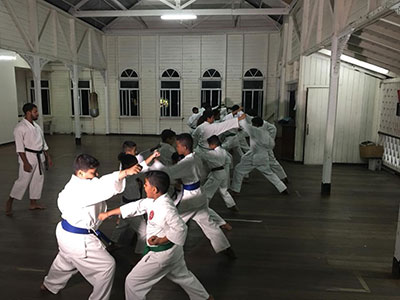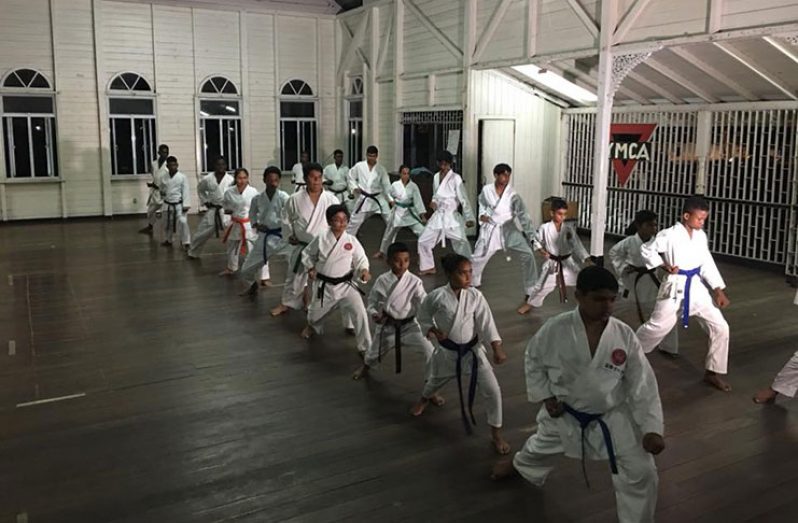By Gibron Rahim
KARATE is an undoubtedly well-known martial art. In fact, we might sometimes mistakenly categorise all the martial arts we see in films as karate. Contrary to portrayals in popular culture; however, its focus is not on violence. Karate builds mental discipline even as practitioners learn to defend themselves and others against harm.
The term ‘karate’ translates to “empty hand”. The martial art focuses on the use of defensive and counterattacking body movements rather than the use of weaponry.

Practitioners or karatekas as they are called, of the Shotokan style of karate, progress through belts beginning with white all the way up to black. There are also different dans (or ranks) of black belt karatekas. The ‘Association do Shotokan Karate’, Guyana’s YMCA school, is among Guyana’s admittedly small number of groups that train practitioners in karate.
The Pepperpot Magazine spoke to two of the school’s older practitioners to learn about their experiences with karate. Wanda Agdomar, a brown belt, began practising karate when she was in primary school. She recalled that she would attend classes after school. Unfortunately, Agdomar had to stop attending classes to prepare for CSEC when she entered the Fifth Form. She revealed that she had only recently restarted classes after a 15-year gap.
Agdomar affirmed that karate has taught her discipline. “It’s a disciplined sport, it’s more for self-defence and not like the other [martial] arts like ju-jitsu,” she said. Karate, she noted, is more about defending oneself and not necessarily violently at that. One of the aspects of karate is kumite. Agdomar explained that kumite involves karatekas sparring with one another, with one person attacking and the other blocking. “As in everything you have different aspects and that is included in karate but it’s not anything violent,” she said. Violence is always the last possible resort for practitioners.

BENEFITS OF KARATE
There are psychological benefits to practising karate. “I think it makes you stronger mentally because sometimes, as with anything that you do, you have to have your head on to get your techniques right,” explained Agdomar. “And then we have the gradings that we do so you have to be physically, as well as mentally prepared to get to the other belt,” she added. Advancing to higher belts through the various grades requires mastery of a kata (detailed pattern of movement) and either one-step or three-step sparring.
Tournaments provide invaluable learning opportunities for karatekas. Agdomar related that regular karate practices only involve persons from a single school. On the other hand, “When you go to a tournament you see other persons from different schools,” she said. “They have different styles, although it’s still Shotokan there are different styles that they come with.” She opined that the YMCA school practices traditional Shotokan. “I think this is the best one, that’s why I came back.”
Leonard Leuwaisee began practising karate around 40 years ago. Progressing to his black belt and then beginning to advance through the dans, Leuwaisee stopped practising karate when he migrated to Barbados 36 years ago. Though he wanted to restart, he was hindered by the challenges of moving to a foreign country and beginning a new life. Several years ago; however, he finally began practising karate again. There was no true difficulty in doing so. “The mental feeling was always there as well as certain basics,” Leuwaisee explained. In fact, he was able to resume at the same rank he had stopped at.
Leuwaisee also noted the mental benefits of karate. “I find that it helps you in terms of giving you a clarity of mind, of thinking,” he said. “It also enhances your health.” He, like Agdomar, pointed out that karate can be used to defend oneself. He emphasised, however, “At the same time, being in karate doesn’t mean it makes you violent – at times it calms you.” As karatekas advance to higher ranks, he said, they become more aware of the kind of harm they can do. As a result, they tend to avoid circumstances that would lead to the use of force. “It gives you a different discipline of mind, body and spirit.”
Self-defence
Learning self-defence is an option that might at least be considered in today’s troubled times. “I would personally advise anybody in this climate of how the world is today to learn something,” Leuwaisee said, “not so much to fight but it gives you that discipline.” He opined that, from his observations in Barbados, children who practise karate also do well in school. He expressed his personal belief that the employment of mental faculties that practising karate requires translates into the academic life of young karatekas.
Though karate might not necessarily be for everyone, “It’s something to try,” Agdomar said. She conceded that, while not everyone will like karate, parents can always take their children to classes where they may be pleasantly surprised to find that they enjoy it. She pointed out the benefits for younger practitioners especially.
“It will help to give them some amount of self-confidence,” she pointed out. She noted that bullying has become more commonplace in schools today. “It’s not that they’re going to be fighting but you know that, in case anything happens, they can defend themselves,” she stated and emphasised, “It’s not about brute force and ignorance, it’s defending yourself.”



.jpg)











